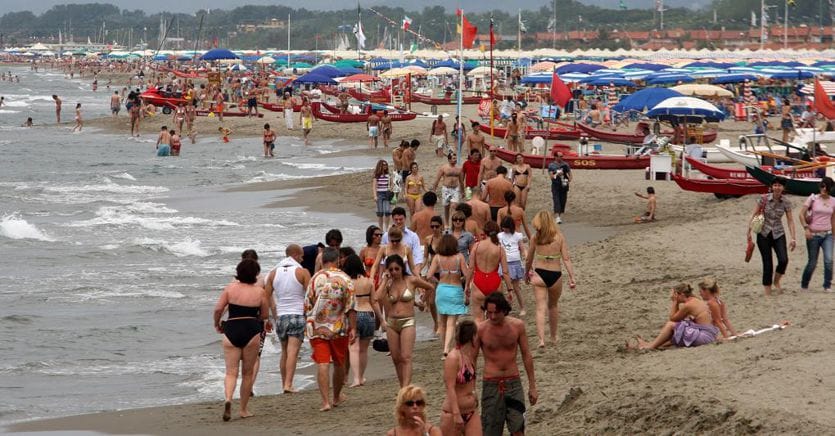Six months ago, when the war in Ukraine broke out, the clouds had thickened in Forte dei Marmi: the concern for the conflict was added to that for the performance of the local economy, driven by tourism and, in particular, by big spenders Russians and Ukrainians who have taken root for more than twenty years in the town of Versilia, which has become one of the international luxury destinations.
Six months later
The forecast of a summer without Russians, kept away from war and economic sanctions, was frightening, especially after two years in which (all) foreign presences had collapsed due to the pandemic: in Versilia in 2019 the Russians were worth 15 thousand arrivals and 74 thousand overnight stays (plus 2,450 Ukrainians with 9,285 overnight stays); in 2021 they fell to just over three thousand arrivals and 13,500 overnight stays, with a drop of close to 80%. But now, in late August, much of those fears about summer 2022 have dissolved. The Russians and Ukrainians are at the Fort. Against all odds. They rented villas, buy luxury fashion, go to restaurants, walk around the center, play tennis. Some, owners of villas, even arrived in spring, to escape the echoes of a war that comes here muffled and far away. “Already in February we saw a ferment that had never existed before – confirms Marco Vaiani, owner with his family of five restaurants on the Forte’s seafront, including the elegant Bistrot, Fratellini’s and Pesce Baracca – a ferment that is the son of geopolitical events. In the following months, arrivals increased. Now that we are in the middle of the season, the presences of Russians and Ukrainians are back to the levels of 2018-2019, that is, before the pandemic. I don’t see any differences ».
Russians with homes in London and Rome
Vaiani has an explanation for this surprising dynamic: “80-90% of our customers live in Geneva or Lugano, or have a home in London or Rome, so they are ‘westernized’ and easy to move around – he explains – it doesn’t seem to me that their uses and consumption have been affected much by the conflict. It is different for those who live in Ukraine, who have inevitably seen many things change ”. Even an infallible indicator of attendance, such as that of “Russian” villa rentals, indicates ‘sold out’: “There are no signs of prestigious residences left on the market – explains Gianfranco Lorenzo of the Tourist Studies Center in Florence – the season al Forte is doing well, even if the Russian segment has probably reduced in terms of the component represented by the middle class and families ”. The absence of Russian families was partly felt at the Augustus hotel, a historic five-star hotel in the Tuscan town (for 40 years, until the end of the 1960s, it was the summer retreat of the Agnelli) which, before Covid, in the months in July and August, it reached 35% of Russian customers, with peaks of 40%. «Some families who live in Russia this summer were not able to come – explains Giacomo Maschietto, managing director and owner of the resort – and for us it was a great disappointment, given that they were historical customers. Fortunately, since the outbreak of the pandemic we have decided to diversify the markets and today, thanks to the strong increase in Americans and Arabs, we are returning to pre-Covid levels ». At Augustus in June the Russian clientele stopped at 2%, in July it went to 12%, in August it will reach 15%. «The ascent has begun – adds Maschietto – and we hope that Russian customers, who remain an important target, will soon return to pre-Covid levels. In the contraction of this year we must also consider the fact that those who moved late did not find a place, because from 1 July to 20 August we are fully booked ».
Merchant discretion
Not all hotels and luxury shops at the Fort are available to answer questions about the presence of Russians. Many prefer “not to give details on this sensitive subject” or hide behind phrases such as “we have few Russian clients”. The slippery terrain is that of payments (and of the current accounts and bank circuits from which they come), which is precipitating, among other things, requests for VAT refunds through tax free operators. Global Blue, for example, last June found in Forte dei Marmi an average receipt of Russian buyers equal to 578 euros, down by 61% compared to June 2019, and an overall expenditure collapsed compared to the pre-pandemic. But the decline, as the experts explain, is largely linked to the desire not to be tracked, and therefore to the Russians’ failure to resort to tax free, rather than to the lack of purchases. On the other hand, the transactions of Arabs and Americans are flying, never as present as this year. «The Russians and the Ukrainians? Here there have always been mixed families – explains Umberto Buratti, former mayor of Forte dei Marmi and parliamentarian in the legislature that is closing – and they are there again this year. Of course, there are no oligarchs close to Putin, but for the rest the Russian presences contribute to making good the data on tourism. ” touching 12-14 thousand euros per square meter, dreams of a summer at pre-Covid levels: going back from 300 thousand presences in 2021 (Istat data without tourist rentals) to 412 thousand in 2019 is not a taboo, also thanks to the Russians.
